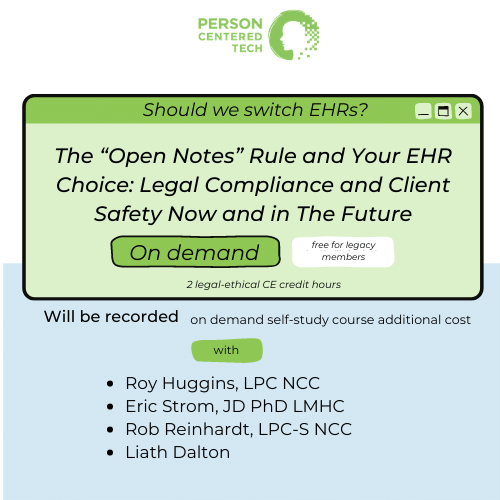2 CE Credit Hour On Demand Presentation on EHR Choice and the Information Blocking Rule
The “Open Notes” Rule and Your EHR Choice: Legal Compliance and Client Safety Now and in The Future
Listen to a wealth of experts in security, digital ethics and EHR platforms in order to answer the question on every practice owner’s mind:
“Should I switch our EHR system?”

A “Person Centered” Technology Mindset
The Information Blocking Rule, aka “The Open Notes Rule,” is already changing the way we release records and share notes with clients. Many practices are strongly considering how they want to manage their electronic records now and in the future so as to:
- Make time to change their processes of notes-writing in a way that reduces harm to therapeutic alliances — or other harms.
- Better control how session notes are disclosed to clients
- Reduce potential client harms based on high transparency of session notes
Technology with Compliance and Client Safety
Adapt the learner’s use of electronic records services to meet both legal compliance needs and ethical client safety needs
Information Blocking Rule
Describe how the Information Blocking rule impacts clients’ legal rights to get copies of their full mental health records
Practical Support for EHR Selection
Describe the landscape of state and federal legal requirements for the use of electronic records systems
Thank you for the information and for making it so accessible. Somehow you take the driest material and make it fun and immediately relevant. You folks knock it out of the park!
Compliance and Client Safety At the Forefront
This continuing education program for Counselors, Clinical Social Workers, Marriage and Family Therapists, and Psychologists will explore the past, current, and future legal-ethical environment of electronic record keeping with a mind towards managing disclosures to clients while respecting client rights of access and also, at the same time, reducing potential client harm.

Course Details
2 CE Credit Hour. Self Study
Title: The “Open Notes” Rule and Your EHR Choice: Legal Compliance and Client Safety Now and in The Future
Authors/Presenters: Roy Huggins, LPC NCC; Eric Strom, JD PhD LMHC; Rob Reinhardt, LPC-S NCC; Liath Dalton
CE Length: 2 CE credit hours, legal-ethical
Legal-Ethical CE Hours: 2 legal-ethical CE hour
Educational Objectives:
Adapt the learner’s use of electronic records services to meet both legal compliance needs and ethical client safety needs
- Describe how the Information Blocking rule impacts clients’ legal rights to get copies of their full mental health records
- Describe the landscape of state and federal legal requirements for the use of electronic records systems
Syllabus:
- Intro to Information Blocking (aka “Open Notes”) and Your Electronic Records System [Huggins and Dalton]
– Which types of electronic records are impacted?
– How are ONC-certified electronic records services implementing records releases now?
– How are non-ONC-certified services handling records releases now?
– How can practices use (or not use) the exception in the Information Blocking Rule to protect clients from foreseeable harms? - Client Rights of Access and Information Blocking (aka “Open Notes”) [Strom]
– What does the Information Blocking Rule change (or not change) about clients’ legal rights to access records?
– What are clients’ legal rights to access records?
– How will clients’ rights to access their records change in the future? - EHR Systems and Information Sharing Past, Present, and Future [Reinhardt]
– What is a Health Information Exchange (HIE) and what is “interoperability”?
– How have states and the federal government mandated (or not) electronic records usage, information sharing, and fast records access in the past and how do they mandate (or not) them now?
– How are states and the federal government likely to set those mandates going into the future? - Q&A with all presenters
Register
The “Open Notes” Rule and Your EHR Choice: Legal Compliance and Client Safety Now and in The Future
2 CE Credit Hour Self Study
Meet Our Presenters
Presented by Roy Huggins, LPC NCC; Eric Strom, JD PhD LMHC; Rob Reinhardt, LPC-S NCC; Liath Dalton

Roy Huggins, LPC NCC, is a counselor in private practice who also directs Person-Centered Tech. Roy worked as a professional Web developer for 7 years before changing paths and makes it his mission to grow clinicians’ understanding of the Internet and other electronic communications mediums for the future of our practices and our professions.
Roy is an adjunct instructor at the Portland State University Counseling program where he teaches Ethics and is a member of the Zur Institute advisory board. He has acted as a subject matter expert on HIPAA, security, and clinical use of technology for Counseling licensure boards, and both state and national mental health professional organizations. He has co-authored or authored 2 book chapters, and he routinely consults with mental health colleagues on ethical and practical issues surrounding tech in clinical practice. He served for 5 years on the board of the Oregon Mental Health Counselors Association and then the Oregon Counseling Association as the Technology Committee Chair.
He really likes this stuff.

Eric Ström JD PhD LMHC is an attorney and Licensed Mental Health Counselor in Seattle, Washington. As an attorney, Eric provides legal counsel, consultation, and guidance to mental health professionals. Eric’s counseling practice is focused on providing counseling services to combat veterans as well as providing supervision and consultation to other clinicians. Eric currently serves on the American Mental Health Counselors Association Ethics Committee, and is the ethics advisor for the Washington Mental Health Counselors Association. Eric has taught a range of courses in counseling and professional ethics at a variety of graduate and undergraduate programs.
Eric earned a PhD in Counselor Education and Supervision at Oregon State University, a Master of Arts Degree in Counseling Psychology from the Northwest School of Professional Psychology at Argosy University Seattle, graduated cum laude from Wayne State University School of Law in Detroit Michigan, attended the Hague Academy of International Law in the Hague Netherlands, and received a Bachelor of Arts degree in Linguistics from the University of Michigan.

Rob Reinhardt, LCHMCS, M.Ed., NCC has his own successful counseling practice and is CEO of Tame Your Practice. Known for his expertise in reviewing and recommending EHRs for therapists, Rob previously worked in Information Technology for over ten years and has lived around technology his entire life. With a comprehensive mix of technology, clinical, and business experience he can provide consultation and coaching regarding all facets of private practice.
Rob is the creator of Describe, the popular deck of cards and activities that can be used with individuals, families and groups of all ages. He is the author of the Guide to Choosing An EHR, and co-author of Private Practice Preparedness. He’s also co-host of the popular podcast, TherapyTech with Rob and Roy and a former column editor for Counseling Today, the professional magazine published by the American Counseling Association.
Rob is also a fan of board gaming, ultimate frisbee, travel, and quality time with his family.

Liath Dalton is a Ph.D candidate in Religious Studies. She began her academic career at Reed College and continued her graduate work at the University of Cape Town.
Liath is the Deputy Director for Person Centered Tech and runs our HIPAAppropriateness review program. Through her combination of experience evaluating products for their utility and security in regards to how they can meet risk management needs and providing guidance to members around what product options will best meet their specific practice needs, Liath has an intimate knowledge of both what the practice tech needs are for mental health professionals and what it takes for a product to meet those needs.
Resources & Citations
- Information Blocking and the ONC Health IT Certification Program: Extension of Compliance Dates and Timeframes in Response to the COVID-19 Public Health Emergency, 85 FR 70064 (November 4, 2020) (to be codified at 45 CFR parts 170, 171)
- US Dept. of Health and Human Services. (2006). HIPAA Administrative Simplification. Washington, DC: Author.
- US Dept. of Health and Human Services. (2013). HIPAA Omnibus Final Rule. Washington, DC: Author.
- US Dept. of Health and Human Services. (2020). Proposed Modifications to the HIPAA Privacy Rule to Support, and Remove Barriers to, Coordinated Care and Individual Engagement. Retrieved January 08, 2021, from https://www.hhs.gov/sites/default/files/hhs-ocr-hipaa-nprm.pdf
- US Dept. of Health and Human Services. (2021). Information Blocking FAQs. Retrieved January 21, 2021, from https://www.healthit.gov/curesrule/resources/information-blocking-faqs
Additional Information
Accuracy, Utility, and Risks Statement: None.
Conflicts of Interest: None reported.
Commercial Support: Person Centered Tech Inc. is sponsoring this event and will give a brief commercial presentation during the break.
